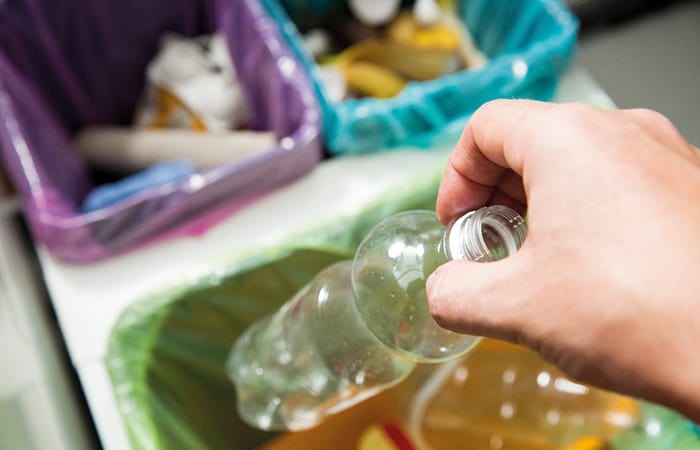Viewpoint
 Design-led, science-based approaches will ultimately mean we can eradicate harmful waste, recognise the value of plastic and benefit fully from this remarkable material, writes Philip Law
Design-led, science-based approaches will ultimately mean we can eradicate harmful waste, recognise the value of plastic and benefit fully from this remarkable material, writes Philip Law
Plastic is not designed to end up in the marine environment – yet around the world plastic waste is leaking into our oceans. Tackling this issue requires a widespread response at international, governmental and local levels. As more than 80 per cent of marine litter comes from a small number of Asian countries, these areas are highly significant. However, every country – and arguably every citizen – has a role to play as we rethink our relationship with this remarkable material.
The modern world is made possible by plastic. It saves lives in hospitals in medical devices, helps supply our drinking water via durable pipes, is essential for digital devices to function and helps preserve our food. Plastic packaging, often in the spotlight for negative reasons, is lightweight and cheap to produce. It can be solid or flexible, transparent or opaque, chemical-resistant, heat-tolerant, and safe for food contact. According to a 2016 Trucost report, environmental costs increase four times without plastic packaging – with production, shipping and end-use environmental impacts all rising.
Biodegradable plastics have often been mooted as a potential solution. However, what isn’t generally recognised is that special conditions are often needed for the material to decompose, such as those provided by industrial composting. Additionally, biodegradable materials have been shown not to fully break down within the marine environment. Biodegradable plastics that end up in landfill also have the potential to release methane, a more potent greenhouse gas than CO2. Very importantly, biodegradable plastics can also undermine existing recycling for conventional plastics and preclude their use in numerous long-term applications. Even the very suggestion that they may be present in these recycling streams can cause specifiers to be concerned about the integrity of their products.
It is technically possible to recycle all plastics. However, economics largely determine those that are recycled at scale, showing a truly circular economy should begin with design. Designers should create packaging that can easily be recycled. But designers ultimately are steered by clients’ demands, so brands and retailers also have an essential role to play. The principles of the current UK recycling infrastructure are, however, solid. Kerbside collection works. Some 99 per cent of local authorities collect plastic bottles, with the number of local authorities collecting pots, tubs and trays increasing and currently at 76 per cent. The UK is ranked second for commercial and industrial packaging recycling in the EU, and seventh for plastic packaging. Currently 22 per cent of plastic packaging reaches landfill, but the UK plastic supply chain’s current aim is to reach zero by 2030.

Improvements to the system are needed but each proposal should be carefully considered. Deposit return schemes (DRS), for example, are a prima facie ‘green’ solution where consumers return their own bottles. Some DRS systems, such as Germany’s, work well. Others, like South Australia’s, do not. One complicating factor is the unknown impact on the well-established kerbside collection system in the UK, with a DRS potentially siphoning off valuable items.
The British Plastics Federation Recycling Group’s strategy document of 2017 proposed introducing incentives for companies to use recycled content and for products to be designed to maximise recyclability. Extended producer responsibility (EPR) can help achieve this, with companies offsetting their producer responsibility costs through resource-efficient product design, such as specifying a certain percentage of recycled content. Critically, a reformed Packaging Waste Recovery Note system – which certifies plastic has been properly recovered or recycled – is needed that encourages the growth of UK recycling infrastructure. Littering needs to be addressed too.
There are limits to conventional recycling – multi-laminate, composite and thermoset materials, as well as contamination, all pose challenges. Chemical and pyrolysis recycling methods provide a potential answer – technologies that break down long polymeric carbon chains into medium-length chains, producing waxes and synthetic crude oil to make new plastics. Scaling these technologies up will require investment.
In developing nations without waste infrastructure, local solutions are needed. NGOs such as Waste Aid work with communities to turn plastic waste into economic opportunities.
A theme runs through this – recognising the value of plastic. The future should be one in which the consumer recognises plastic as a recyclable and valuable resource and seeks to keep it working within the economy. Society needs plastic – and it can’t afford to keep throwing it away.
Philip Law is director-general of the British Plastics Federation and of the Council of International Plastics Industry Association Directors (CIPAD)




Red Bull makes hydrogen fuel cell play with AVL
Formula 1 is an anachronistic anomaly where its only cutting edge is in engine development. The rules prohibit any real innovation and there would be...